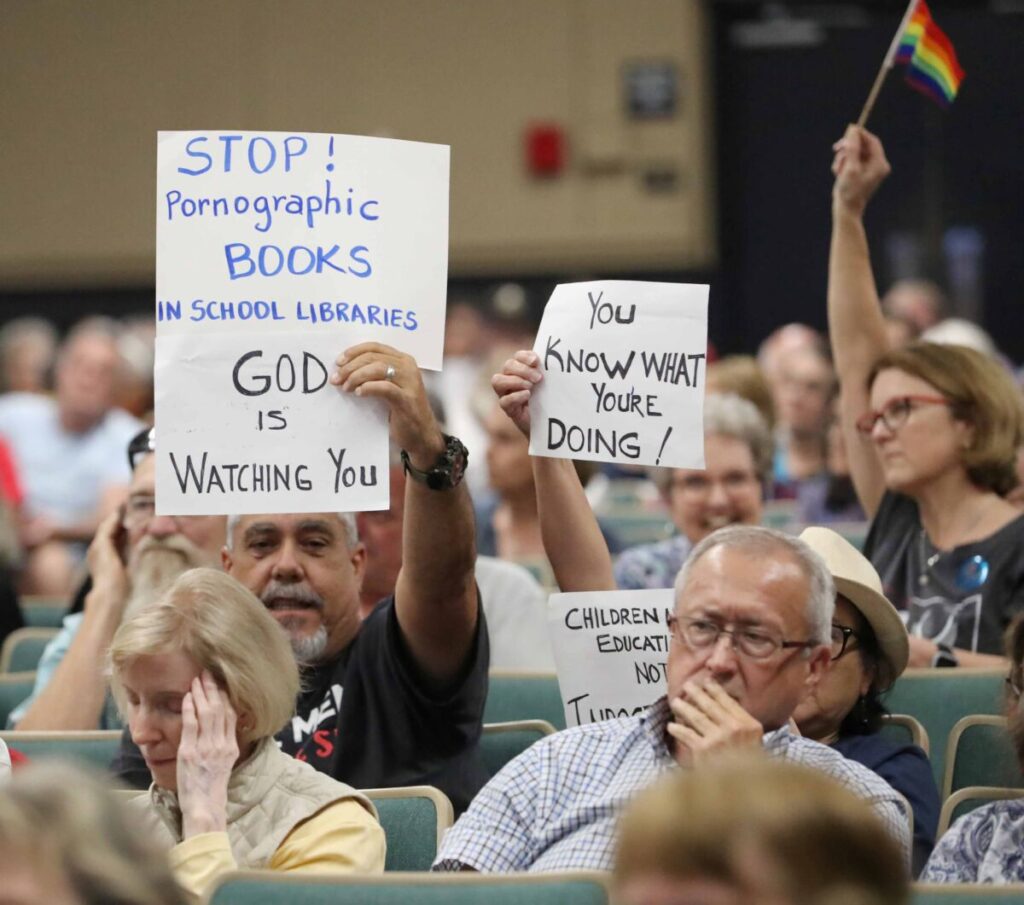Senate supports limits to book objections

People pack the auditorium as they hold signs during the “Citizen Emergency Rally To Stop Pornographic Books” in Marion County Public Schools libraries rally during a meeting of the Marion County Public School Board in Ocala, Fla. on Tuesday, March 28, 2023. [Bruce Ackerman/Ocala Gazette] 2023.
TALLAHASSEE — The Florida Senate on Tuesday backed a wide-ranging education measure that would limit the number of book objections from people who don’t have kids in schools, as Senate President Kathleen Passidomo said some Floridians have gone “overboard” with filing the challenges.
Senators voted 28-11 to approve the measure (HB 1285), with significant changes to a version that the House passed last month — meaning it will have to go back to the House for approval before it could go to Gov. Ron DeSantis.
The House had approved the bill on Feb. 15 with a provision that sought to assess $100 “processing” fees for unsuccessful book objections. The proposed policy would have allowed fees to be assessed for people if they did not “have a student enrolled in the school where the material is located” and had “unsuccessfully objected to five materials during the calendar year.”
But an overhaul of the bill filed by its Senate sponsor, Danny Burgess, R-Zephyrhills, changed the approach toward certain book objections.
Under the tweaks to the bill approved by senators Tuesday, the proposal seeks to limit certain people to one book objection per month.
“A resident of the county who is not the parent or guardian of a student with access to school district materials may not object to more than one material per month. The State Board of Education may adopt rules to implement this provision,” the revamped provision says.
The issue of book objections has become a political battleground in the last two years, after the Legislature and DeSantis have approved measures that bolstered scrutiny of such materials.
The governor last month said he had called on the Legislature to take steps to curb “frivolous” book challenges. A news release from the governor’s office said that the state “empowered parents to object to obscene material in the classroom.” But the release also said that some people had “abused” the process to file objections to books such as “Johnny Appleseed,” “The Giver” and the Bible.
“We also know that some people have abused this process in an effort to score cheap political points,” the governor said in a prepared statement on Feb. 15. “Today, I am calling on the Legislature to make necessary adjustments so that we can prevent abuses in the objection process and ensure that districts aren’t overwhelmed by frivolous challenges.”
Passidomo on Tuesday similarly touted legislation in previous years that ramped up book scrutiny, but acknowledged the policy needed to be revisited.
“We in good faith passed a bill that gave people the right to look at what kind of books would be in school libraries,” Passidomo, R-Naples, told reporters. “I’ve had parents bring some of those books to me, and I was appalled.”
Passidomo added, however, that “people went overboard, and they started objecting to the classics, like Shakespeare,” which she called “ridiculous.”
“So … we needed to rein that in,” she said.
Democrats have heavily criticized efforts to scrutinize school books, likening such measures to book bans. During floor discussion about the bill Tuesday, Sen. Lori Berman, D-Boca Raton, peppered Burgess with questions.
“Do we think that this is going to truly make a difference in the way that our larger book bans have gone?” Berman asked.
“I don’t believe that we stepped on anything in the original bill that we passed,” Burgess replied. “What we’re doing, though, is recognizing that we could always improve.”
The sweeping education measure also would direct the state Board of Education to craft rules that would lead to the creation of a “classical education teaching certificate” in Florida.
The bill would require that such certificates could be issued “upon the request of a classical school, to any applicant who fulfills the requirements” of a part of state law dealing with eligibility criteria for certificates.
The bill would exempt applicants for a classical education certificate from meeting requirements that they “demonstrate mastery of general knowledge,” “demonstrate mastery of subject area knowledge,” or demonstrate “mastery of professional preparation and education competence.”
The measure defines a classical school as one that “implements and provides professional learning in a classical education school model that emphasizes the development of students in the principles of moral character and civic virtue through a well-rounded education in the liberal arts and sciences that is based on the classical trivium stages of grammar, logic, and rhetoric.”
For the “Ocala Gazette’s” coverage on this issue, see “Heated debate over ‘book banning’ takes over school board meeting.”





